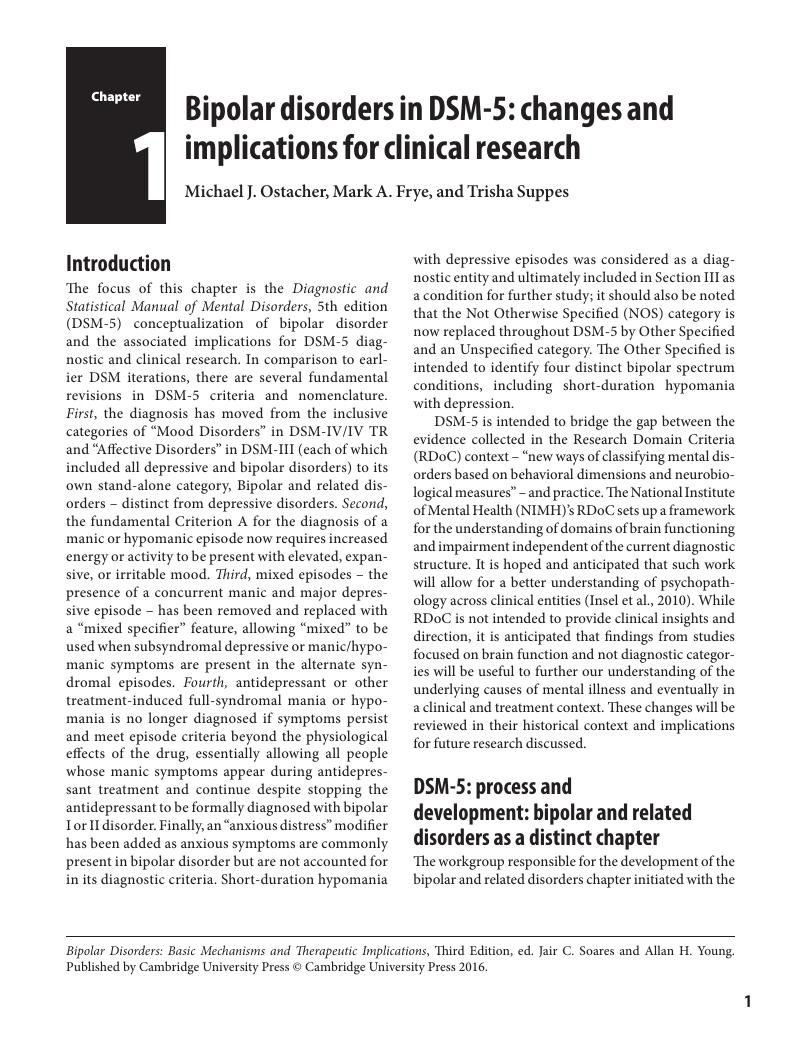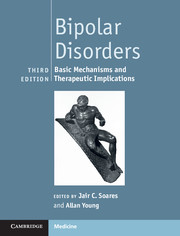Book contents
- Bipolar DisordersBasic Mechanisms and Therapeutic ImplicationsThird Edition
- Bipolar Disorders
- Copyright page
- Contents
- Contributors
- Preface
- 1 Bipolar disorders in DSM-5: changes and implications for clinical research
- 2 Prospects for the development of animal models of bipolar disorder
- 3 An assessment of the catecholamine hypothesis of bipolar disorder
- 4 Serotonergic dysfunction in bipolar disorder
- 5 Involvement of the GABA and glutamate neurotransmitter systems in bipolar disorder
- 6 Oxidative stress and neuronal resilience – implications for the pathophysiology of bipolar disorder
- 7 Circuitry-specific hypermetabolism in the hippocampus of bipolar patients
- 8 The neuroendocrinology of stress in the pathophysiology of bipolar disorders
- 9 Brain imaging abnormalities in bipolar disorder
- 10 Sleep and circadian rhythms in bipolar disorders
- 11 The role of infectious agents in the causation of bipolar disorder
- 12 EEGs and ERPs in bipolar disorders
- 13 Genetic factors in the etiology of bipolar disorder
- 14 Neurocognitive findings in bipolar disorder: an update
- 15 Psychotherapeutic interventions in bipolar disorder
- 16 The kindling/sensitization model and the pathophysiology of bipolar disorder
- 17 Biological factors in bipolar disorder in childhood and adolescence
- 18 Biological factors in bipolar disorder in late life
- 19 Perspective for new pharmacological interventions
- 20 Physical health and metabolic dysfunction in bipolar disorder
- 21 Immune dysregulation in bipolar disorder
- Index
- References
1 - Bipolar disorders in DSM-5: changes and implications for clinical research
Published online by Cambridge University Press: 05 May 2016
- Bipolar DisordersBasic Mechanisms and Therapeutic ImplicationsThird Edition
- Bipolar Disorders
- Copyright page
- Contents
- Contributors
- Preface
- 1 Bipolar disorders in DSM-5: changes and implications for clinical research
- 2 Prospects for the development of animal models of bipolar disorder
- 3 An assessment of the catecholamine hypothesis of bipolar disorder
- 4 Serotonergic dysfunction in bipolar disorder
- 5 Involvement of the GABA and glutamate neurotransmitter systems in bipolar disorder
- 6 Oxidative stress and neuronal resilience – implications for the pathophysiology of bipolar disorder
- 7 Circuitry-specific hypermetabolism in the hippocampus of bipolar patients
- 8 The neuroendocrinology of stress in the pathophysiology of bipolar disorders
- 9 Brain imaging abnormalities in bipolar disorder
- 10 Sleep and circadian rhythms in bipolar disorders
- 11 The role of infectious agents in the causation of bipolar disorder
- 12 EEGs and ERPs in bipolar disorders
- 13 Genetic factors in the etiology of bipolar disorder
- 14 Neurocognitive findings in bipolar disorder: an update
- 15 Psychotherapeutic interventions in bipolar disorder
- 16 The kindling/sensitization model and the pathophysiology of bipolar disorder
- 17 Biological factors in bipolar disorder in childhood and adolescence
- 18 Biological factors in bipolar disorder in late life
- 19 Perspective for new pharmacological interventions
- 20 Physical health and metabolic dysfunction in bipolar disorder
- 21 Immune dysregulation in bipolar disorder
- Index
- References
Summary

- Type
- Chapter
- Information
- Bipolar DisordersBasic Mechanisms and Therapeutic Implications, pp. 1 - 7Publisher: Cambridge University PressPrint publication year: 2016



